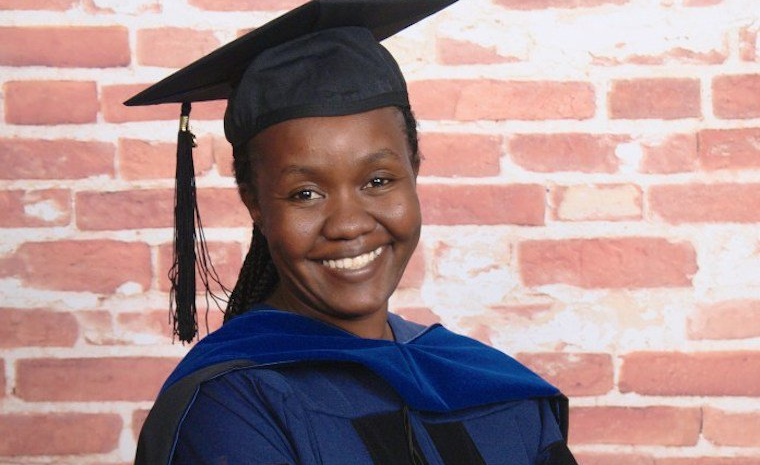Dr. Fridah Mokaya is the first of her family to pursue a science course despite a rocky start. For a lot of people who attain the accolades she has science came easily but for Dr. Mokaya it took dedication and determination.
In high school when it came time to pick her examinable subjects she missed the cut off mark for Physics by a mere 2% but her father intervened to help steer her to her fate.

She told African Warrior Magazine, “One thing I will never forget is that in all this, my Dad did not talk much, he just told the teacher that I was his daughter and he knew me and what I can do and he had no doubt that I will excel in physics. This was the turning point. My Physics teacher Mr. Orinda, saw how distressed I was and knowing my potential told the deputy principal that he had allowed me in the Physics class on condition that I had to perform. Let’s just say that I worked hard and it paid off. I got an “A” in Physics when I sat for my KCSE exam. Looking back, I know that were it not for the deep belief that my parents and teacher had in me, I may not be where I am.”
The next disappointed came in University. When she was about to graduate from Jomo Kenyatta University of Agriculture and Technology in Kenya for a Bachelor of science degree in Physics she found herself lower of the list than she had hoped.
“I did my four years in campus with very good grades and just a few days to graduation when the graduation list was out, lo and behold my name was on the second-class honors lower division list. I had never felt so distressed in my life. All the arduous work I had put in, including the late nights for a second class lower?” she said “I was very heart broken.”
As fate would have it she ended up pursuing her master’s degree (M.Sc. Physics) in the United States at the Binghamton University (SUNY). Then moving on to the PhD Program at the University of Connecticut where she conducted research in the field of Experimental Nuclear and Hadronic Physics.
“In the simplest terms, we use the nucleus as a “laboratory” to study fundamental interactions. So why is all this important? Well, it’s because it enables us to understand the fundamental building blocks of nature.” She elaborated
Not only was she the only black Physics PhD female (student) in my department she also had to juggle being a new mother.
“I want everyone to know that anyone can achieve anything you want in life… Challenges along the way should propel you to keep going and not discourage you.”
“If I could influence more women to pursue STEM related subjects, then I will be the happiest person.” She concluded

